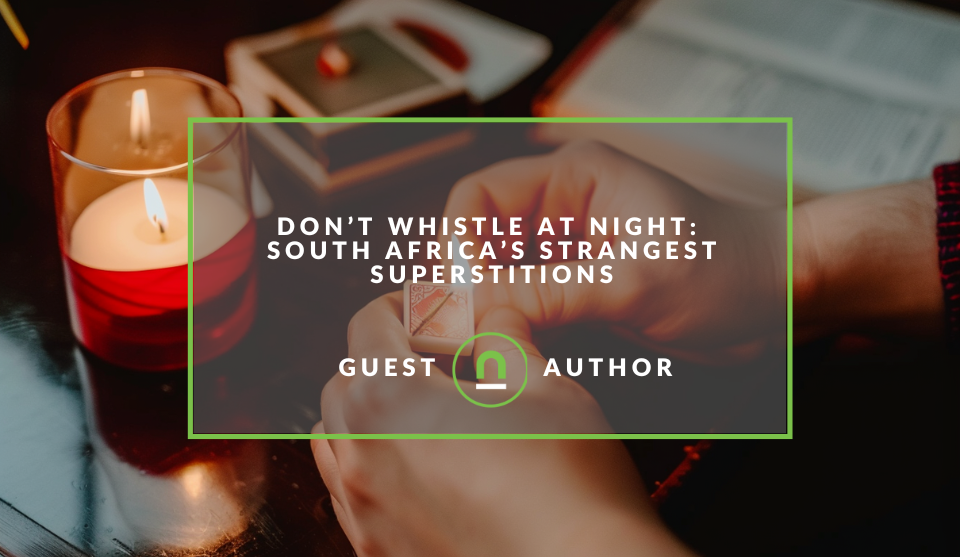Recent posts

Mind, Body & Soul
Do Not Whistle at Night: South Africas Strangest Superstitions
26 April 2025

Geek Chic
How to Replace A Broken Lenovo Laptop Screen
24 April 2025

Money Talks
Everything You Need to Know About SASSA Status Check
13 April 2025

Mind, Body & Soul
The Genetic Diversity of Cannabis Seeds
12 April 2025
Popular posts
Extravaganza
Trending Music Hashtags To Get Your Posts Noticed
24 August 2018
Geek Chic
How To Fix iPhone/iPad Only Charging In Certain Positions
05 July 2020
Extravaganza
Trending Wedding Hashtags To Get Your Posts Noticed
18 September 2018
Money Talks
How To Find Coupons & Vouchers Online In South Africa
28 March 2019
Do Not Whistle at Night: South Africas Strangest Superstitions
26 April 2025 | 0 comments | Posted by Julian Parker in Mind, Body & Soul
In South Africa, the sun might set on rationality, but it never quite puts superstition to bed.
There’s a rhythm to life here, part fact, part folklore. You can be a data scientist with an app that reads stock trends, and still refuse to sweep your home after dark.
A schoolteacher with two degrees who won’t hang a mirror opposite her front door. A teenager who doesn’t believe in ghosts, but still won’t whistle at night. Not because they know something will happen, but because, deep down, they know better.
Superstition in South Africa isn’t just a cultural quirk. It’s an invisible architecture. A survival strategy. A soft map of meanings passed from generation to generation, often without a word spoken. And it’s still everywhere.
The Things We Don’t Do
Don’t eat with a knife and fork during a thunderstorm, it attracts lightning. Don’t point at graves. Don’t walk over a person lying on the floor, or they’ll stop growing. Don’t call your baby's name too often before they're six weeks old. Don’t whistle at night, “you’ll invite spirits,” someone will say.
Ask around and you'll hear the same patterns. You don’t have to believe them to respect them. That’s the unspoken rule.
In isiZulu, it's called amasiko, customs. In Xhosa, imfundiso yakwantu, the teachings of the people. Even among urbanised youth who live on TikTok and take Ubers instead of taxis, these codes live on, sometimes ironically, sometimes not.
A 2022 university study on cultural habits found that 74% of South Africans, regardless of education level, followed at least one superstition regularly, whether consciously or unconsciously. The most common? Not sweeping the house at night, believed to sweep away luck, visitors, or even money.
But where do these ideas come from?
Folklore as Operating System
Most superstitions are rooted in protection. In a land shaped by migration, colonisation, apartheid, poverty, and spiritual plurality, people needed ways to feel in control of the uncontrollable. Cattle diseases. Childbirth complications. Drought. Crime. Death. So belief systems grew like wildflowers through the cracks.
You consult a sangoma not just to heal, but to understand what’s really happening. You burn imphepho (wild sage) not for the smell, but to anchor a space. You mark thresholds, carry beads, wear bracelets that "cool the blood." And while these things may seem irrational from the outside, they serve a very clear purpose: grounding. Identity. A sense of narrative when nothing makes sense.
The beliefs evolve, too. A cursed WhatsApp chain is the digital cousin of the old warning not to ignore a dream. TikTok is full of creators explaining what it means to dream of water, cows, or dead relatives. The language changes. The message stays.
Superstition in the Suburbs
It’s a mistake to think superstition only belongs in rural villages or ancestral homes. It’s in the city, in Sandton apartments, in gated communities, in the waiting rooms of therapists and lawyers.
Corporate types still take meetings after burning sage. One Joburg wedding planner shared how she’s lost count of brides who push their weddings back a week because a relative had a “bad dream.” Another woman, a finance exec, casually mentions how her mom made her bury coins in her new driveway to invite wealth.
You can walk through Woolworths with a shopping list and still avoid passing a mirror at night. You can listen to crime stats and still feel safer with a red string tied to your wrist.
Where Belief Becomes Behaviour
Superstition doesn't need belief to function, it just needs repetition.
That’s why it’s so powerful. It lives in gesture, in whisper, in instinct.
It's coded into your grandmother’s rules, your uncle’s warnings, your aunt’s side-eye.
And it shapes behaviour in quiet, often unnoticed ways:
- Not wearing black after a funeral.
- Not opening scissors unless you intend to cut something.
- Leaving food for ancestors before big events.
- Speaking gently around babies to keep the energy light.
And when things go wrong? Superstition fills the gaps in logic with emotional truth. Why did the deal fall through? Someone spoke against you. Why did you lose that job? Your aura’s out of balance. Why did the child get sick? You moved into a house without cleansing it.
It may not be scientifically provable. But it feels real. And that’s often enough.
Money, Luck, and Ritual
Money is where superstition often sharpens into ritual. Before betting, pitching, launching, South Africans have their own private rites. Washing hands. Wearing “lucky” clothes. Lighting candles. Avoiding certain words.
Even in places like Stuttafords lounges, you’ll spot someone knock wood, kiss their wrist, or open a prayer app before making a move. Not to show off. Just out of habit. Not taking chances, as the saying goes.
It’s less about the odds, and more about energy. Preparation. Vibes.
Because if something fails, it’s not always the maths that’s wrong. Sometimes the ancestors weren’t consulted.
Are We Superstitious, or Just Spiritual?
There’s a fine line between superstition and spirituality in South Africa, and most people live on both sides of it. Christianity. Islam. Ancestral faith. Traditional healing. Western medicine. Tarot. Yoga. Crystals. Manifesting. Meditation. They mix. They coexist. They even contradict.
No one seems to mind.
What’s important is that something gives you meaning. Even if it’s not rational. Especially if it’s not rational.
You don’t need to believe in curses to knock three times on wood. You just need to know what happened the one time you didn’t.
The Quiet Resilience of Belief
At the end of the day, superstitions aren’t just about what we avoid, they’re about what we protect. Family. Health. Money. Time. Energy.
They’re small acts of faith in an unstable world.
So if you ever find yourself in production in South Africa, and someone warns you not to whistle after dark, maybe don’t laugh it off. Maybe listen. Maybe close the window. Maybe say a quiet “sorry.”
Not because you believe.
But because they do.
Tell us your story
Would you like to write for a nichemarket just like Julia does? Find out how to submit a guest post, and when you're ready, you can contact us.
Are you looking to promote your business?
Natural medicine businesses can create a free business listing on nichemarket. The more information you provide about your business, the easier it will be for your customers to find you online.
Registering with nichemarket is easy; all you will need to do is head over to our sign-up form and follow the instructions. If you require a more detailed guide on how to create your profile or your listing, then we highly recommend you check out the following articles.
Recommended reading
If you enjoyed this post and have time to spare, why not check out these related posts and dive deeper down the rabbit hole that is South Africa.
- Zomato Alternatives In South Africa
- Beware of Fake Delivery Scams Targeting South Africans!
- How Outsourcing To South Africa Can Benefit Your Business
- South Africas Most Popular WhatsApp Scams
Tags: Superstitions, Culture, Guest Post
You might also like
The Genetic Diversity of Cannabis Seeds
12 April 2025
Posted by Alina Jones in Mind, Body & Soul
A look into the South African heritage of cannabis growing and how the country has taken the plant in terms of growing it into a viable industry & th...
Read moreMastering Personalization in Digital Marketing
31 March 2025
Posted by Željka Ristic in Industry Experts
We look at the best content marketing tools to boost engagement and growth and build sustainable marketing campaigns that drive users to take action
Read more{{comment.sUserName}}
{{comment.iDayLastEdit}} day ago
{{comment.iDayLastEdit}} days ago
 {{blogcategory.sCategoryName}}
{{blogcategory.sCategoryName}}
